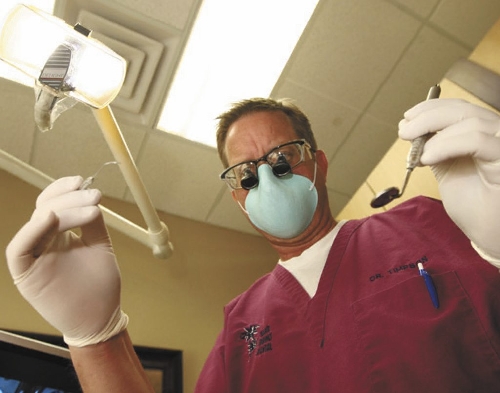Mouth can tell dentist a lot about health
You've heard poets talk about how the eyes are windows to the soul? Let Las Vegas dentist Dr. Peter Balle offer a less poetic but eminently more practical observation.
The mouth, Balle says, "is kind of like a window to your overall health."
From heart disease to eating disorders to gauging just how stressed out you are, a dentist can tell much about your general health by assessing your teeth and gums. Meanwhile, bad oral hygiene may cause, or complicate the treatment of, such medical conditions as heart disease and diabetes, while medical problems elsewhere in the body even can make it more difficult for a patient to maintain his or her dental health.
Dr. Daniel Orr, director of oral and maxillofacial surgery at the University of Nevada, Las Vegas School of Dental Medicine, says dentists long have been aware of a connection between dental health and medical health. Similarly, Orr says, dentists have noticed links between bad dental health and other medical conditions, even if the links were, in many cases, "kind of anecdotal."
It has been only during the past 20 years or so that research has offered solid support for some such links, Orr adds, even if the precise mechanism that connects dental health to general medical health isn't always completely understood.
The most widely investigated link has been the one between bad oral hygiene and heart disease. The gist, according to Dr. Brandon Joe, a Las Vegas periodontist: Studies indicate that people with gum disease "have a higher rate of heart attack compared to people with good oral hygiene."
The reason, according to Joe, may be that bacteria resulting from poor hygiene and gum disease create toxins in the pockets of the gums that then can travel throughout the body via the bloodstream, ultimately creating problems in the arteries and heart valves.
Dr. Corry Timpson of Anthem Village Dental and Warm Springs Dental said the process may involve C-reactive proteins, which are an indication in the blood of inflammation in the body. Elevated levels of C-reactive proteins have been linked with a greater risk of heart disease, and periodontal disease may spur the creation of C-reactive proteins in the body.
"Obviously, it's not a cure-all," Timpson adds. "Somebody could have perfect, healthy gums and still have heart problems. But (gum disease) can aggravate heart problems."
Dr. Misti Song, an internal medicine physician with the University of Nevada School of Medicine, has had patients with "dental needs that precluded them from having surgery."
For example, she says, the risk of infection elsewhere in the body that is associated with gum disease can mean the delaying of stent placements and other heart procedures until "everything is as clean as possible."
Studies also have linked gum disease to complications in the management of diabetes.
"We're not exactly sure how this works," Orr says, "but when people have periodontal disease, they can have an exacerbation of diabetes.
"And it's like the chicken or the egg, because, on the other hand, when you have exacerbation of diabetes, their periodontal disease gets worse. So which one causes the other, or are they mutually synergistic in a bad way?"
Jack Long, 80, takes pains to note that he isn't a doctor or a dentist, but merely a retired stockbroker who was diagnosed with Type 2 diabetes about 10 years ago.
Long never has suffered from serious periodontal problems, but did note that when he'd go to the dentist he'd experience "a little bit of bleeding, but not all the time."
Similarly, Long sometimes would see evidence of bleeding gums when he flossed. But after starting on a new, more intense home gum care regimen about eight months ago, Long noticed something strange: His hemoglobin A1c results -- a measure of blood glucose control over two to three months' time -- improved, dropping from 7 to about 6.2. (A1c ranges between 4 and 6 in people without diabetes.)
Long suspects his new gum care regimen may have something to do with that, even if his physician "thinks it's a lot of hooey."
Long, who always has been and remains physically active, concedes that something else may be playing a part. But, he says, "I can't put my finger on anything else, so I'm giving (it) credit."
Joe notes that people with uncontrolled diabetes do "seem to have a higher chance of getting gum disease," and says he has referred patients to physicians after detecting signs in their mouths that they may have diabetes.
"Being a periodontist, a lot of my patients come to see me and have a lot of pus" in their gum pockets, Joe says. "I tell them to go see a medical doctor and get a blood test for diabetes, and they find out they have a problem."
Meanwhile, the presence of gum disease in pregnant women has been linked to a higher incidence of premature births. "Their babies come out earlier," Joe says, "and their (babies') birth weight is lower than people who do not have gum disease."
Why? "We're still working on it," Joe says, although the answer could, again, relate to the bacteria and toxins that periodontal disease create.
Speaking of which: Pregnancy can affect an expectant mother's dental health. Blame the hormones, Balle says, which can upset pH levels -- a measure of acidity -- in the mouth and create an increased risk of gum disease.
"The gums get more swollen and (teeth) need to be cleaned more frequently," Balle notes.
Prescription drugs can affect the mouth and gums. Beta blocker heart medications, for example, can decrease the flow of saliva and cause a dry mouth. Because saliva provides a "buffer effect" on the teeth and tissues of the mouth, Balle says, a person with a dry mouth is more prone to experiencing tooth decay and gum problems.
A look into the mouth can tell your dentist how stressed you are. There may be evidence of clenching and grinding on the tooth surfaces. Gums also tend to bleed more with stress, Balle says, and stress can cause mouth dryness.
Similarly, a dentist can detect evidence of bulimia or self-induced vomiting by examining the wear on tooth enamel, Orr says, and smoking will manifest itself not only in discoloration of teeth but in the presence of abnormal gum tissue.
Smokers "have a lot of bone loss," Joe adds. "So just by looking at an X-ray -- you may not even have to look at the patient; just give me an X-ray -- I can tell about 90 percent of the time if they're smokers."
And, Joe says, some vitamin deficiencies can be revealed by a look at the tongue.
Physicians are becoming more aware of the relationship between dental health and overall medical health, and Song may be more aware than most: Her husband is Dr. Douglas Sandquist, a Las Vegas dentist.
"I have sent patients to the dentist," Song says, when, for instance, she suspected that a temporomandibular joint disorder or teeth grinding was related to a patient's headaches.
Of course, it is possible that some of the links between health problems in the body and health problems in the mouth are indirect. A person who doesn't care for his or her teeth simply may be similarly lax when it comes to taking care of the rest of his or her body, too.
But, Orr says, researchers are on the trail of finding solid links between dental health and overall medical health. In the case of heart disease, for example, "the studies have been trying to find out if (the connections) are really statistically related, and with the new studies, yeah, this is real," he says.
"Again, you have to be careful. It's common sense that a lot of people are going to have coronary artery disease or lower birth-weight babies whether it's related to oral health or not. People can have all of those things with perfect oral health. But it looks like there is a link, and it's pretty well-proven now."
But, link or no link, Orr says, "what's the downside of taking care of your teeth and being a little healthier?"
Contact reporter John Przybys at jprzybys@ reviewjournal.com or 702-383-0280.





























